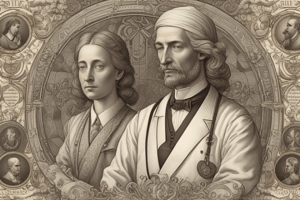Podcast
Questions and Answers
What ancient civilizations attempted to treat and cure diseases?
What ancient civilizations attempted to treat and cure diseases?
Egypt and Mesopotamia
What was the purpose of using castor oil in ancient Egypt?
What was the purpose of using castor oil in ancient Egypt?
- Pain relief
- Stimulate bowel evacuation (correct)
- Embaling
- Surgery
What were some common diseases treated in prehistoric and ancient medicine?
What were some common diseases treated in prehistoric and ancient medicine?
Fractures, arteriosclerosis, pneumonia, urinary infections, stones, parasites, arthritis, tubercular disease.
In the 19th century, medical treatment was fully separated from religion.
In the 19th century, medical treatment was fully separated from religion.
Who were considered high political and social figures in ancient societies for their healing practices?
Who were considered high political and social figures in ancient societies for their healing practices?
What was the ancient belief regarding disease by the Hebrews?
What was the ancient belief regarding disease by the Hebrews?
What deities were associated with healing in ancient Egypt?
What deities were associated with healing in ancient Egypt?
In ancient Egypt, embalmers preserved the liver, lungs, stomach, and intestines in ______.
In ancient Egypt, embalmers preserved the liver, lungs, stomach, and intestines in ______.
How did ancient India detect diabetes?
How did ancient India detect diabetes?
What surgical procedures were performed in ancient India?
What surgical procedures were performed in ancient India?
Flashcards are hidden until you start studying
Study Notes
Introduction to the History of Medicine
- Humankind's medical practices date back almost 5000 years to ancient Egypt and Mesopotamia.
- Evidence of early surgical techniques includes prehistoric skulls with intentional bone removal.
Ancient Egyptian Medicine
- Used potent drugs like castor oil (laxative) and opium (analgesic with narcotic properties).
- Little knowledge of anatomy despite advanced embalming skills.
- Embalming processes included preservation of internal organs and extensive rituals involving spices and solutions.
Common Diseases and Treatments
- Common ailments included fractures, pneumonia, urinary infections, arthritis, and tubercular diseases.
- Early treatments mirrored animal behavior, involving cool water immersion, mud application, and pressure to control bleeding.
19th Century Medical Practices
- Medical treatment strongly intertwined with religion and beliefs about divine punishment for illnesses.
- Tribe healing practices included both kindness and cruelty towards the sick, especially during famines.
Mesopotamian and Hebrew Contributions
- Mesopotamia: Focused on hepatoscopy and believed the liver was central to life and blood.
- Hebrews attributed disease to divine punishment and emphasized balancing the four humors (phlegm, blood, yellow bile, black bile).
Ancient Egyptian Deities and Healing
- Key healing deities included Isis (healing), Hathor (childbirth), and Keket (fertility).
- Diagnoses involved probing wounds, pulse-taking, and examining bodily fluids.
- Public health emphasized cleanliness and personal hygiene.
Ancient Indian Medicine
- Emphasized the cyclical nature of life and performed various surgeries, including cesarean sections and snakebite treatment with tourniquets.
- Detected diabetes by analyzing the sweetness of urine.
Ancient Chinese Medicine
- (Note: Additional details on Ancient China were not provided in the text and are thus omitted.)
Studying That Suits You
Use AI to generate personalized quizzes and flashcards to suit your learning preferences.




